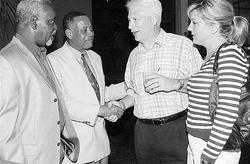
Minister of Labour and Social Security, Derrick Kellier (second left), welcomes Mike and Deidre Stange to the opening ceremony of the joint meeting of the Regional Labour Board and U.S. Employers of Caribbean Workers, at the Rose Hall Resort and Country Club in Montego Bay in January. At left is Alvin McIntosh, chairman of the Regional Labour Board and permanent secretary in the Ministry of Labour and Social security. U.S. employers are impressed with the work ethic of Jamaican migrant workers.- Photo by Noel Thompson
Mark Titus, Freelance Writer
WESTERN BUREAU:
The United States Hospitality Programme started in 1989, but did not take off until 1997 with some 46 United States employers coming on board. However, the access to cheaper labour caused that number to grow to about 140 by the year 2000.
Trevor Baptiste operates a restaurant in Nantucket, Massachusetts, and has 15 Jamaicans on his staff, eight of whom have been working with him since he decided to employ overseas workers in 2001.
The Sunday Gleaner caught up with him on his visit to the island to attend the funeral of one of his former employees recently. Baptiste says his decision to employ the Jamaicans was the best he could have made. His business, he claims, has grown from being just 'another' eatery into one of the most popular eating places in Nantucket, which he credits to his staff members who hail from the reggae country.
"Jamaicans are simply a unique set of people, their service is in high demand in Massachusetts," he said. "Each time the season closes and they leave for home, there is a deafening hush in Nantucket, simply because the work ethic of the Jamaicans are second to none." He added: "Only the Jamaicans are willing to get up at 4:30 every morning to sizzle bacon and scramble eggs, and they have fun while doing it."
The 1991 Iraqi war veteran told The Sunday Gleaner that he recruits his workers through a Jamaican company.
"Over the years, I have gotten my guys through a Jamaican-based recruiting firm. They have an office in Florida and I liaison with that office on a regular basis. I am very confident in their operations," he said. "The beauty is that once a Jamaican worker is shown how to carry out a particular task, he does not necessarily need supervision."
Roy Hare is one such worker. He had a supervisory role at his place of employment in Portland, but a desire to seek better for his family saw him accepting an offer to work overseas. He shares his experience with The Sunday Gleaner.
"The first time I went abroad to work, it was a friend who asked me if I had an interest in working overseas. She introduced me to an overseas employment company in Kingston where my name was submitted.
"The agency called me a few weeks later for a preliminary interview, to establish my work experience, and following the interview, I was informed that my name would be submitted to the office abroad, and selection would be done based on (one's) availability.
Interview
"A few months later I was called to a second interview. At this interview I was asked questions such as my willingness to share quarters with individuals of different cultures than mine. Scenarios were also created and I was required to explain what my approach would be.
"My prospective employer's responsibility was to pay my plane fare, while I was required to pay my insurance, which at the time was about $1,500.
"The challenge that I faced was having to work and live among persons of different cultures and languages; things that are normal for them are not normal for you, and it was only the landlord and his wife that spoke English.
"I was the second Jamaican to work for my boss; the first left a great impression on him, and as a result, much was expected of me. I worked with them for five seasons and saw about five other Jamaicans added to the staff within that period. What was good about working abroad, was that I was able to send home money to my family, which was much better than what I was earning in Jamaica.
"It made me realise how good and how precious my country is; things that we would take for granted in Jamaica, you can't there. If you don't work for a day, don't expect to get paid for it; you get paid for the time you do and nothing more.
More worker friendly
"So it helped me to realise that our labour laws here at home are more worker friendly than in the United States. This has helped me to be more disciplined, (and on) returning home in 2005, I don't take things for granted anymore. If I can go there and commit myself in making a contribution, I believe I should do the same here at home, because this is my country."
Hare has not returned, as he was among the hundreds of Jamaicans affected by the U.S. Government's decision to put a 66,000 cap on the amount of foreign labour that comes in each season, a decision that partially crippled small businesses in the U.S. who depend on the arrival of the seasonal workers from reggae land.
This decision almost jeopardised the programme as more than 50 per cent of our countrymen and women who normally travel to the U.S. to work each season were not allowed to do so.
The outcry of U.S. merchants caused the U.S. Senate to pass a bill that exempted Jamaican hotel workers, who were hired in previous years, from the annual cap on H2B visas. This was a relief for U.S. merchants like Mr. Baptiste.
"While some might not openly admit it, we are indebted to our Jamaican workers. They do stand out above the rest with their attitude and aptitude."

